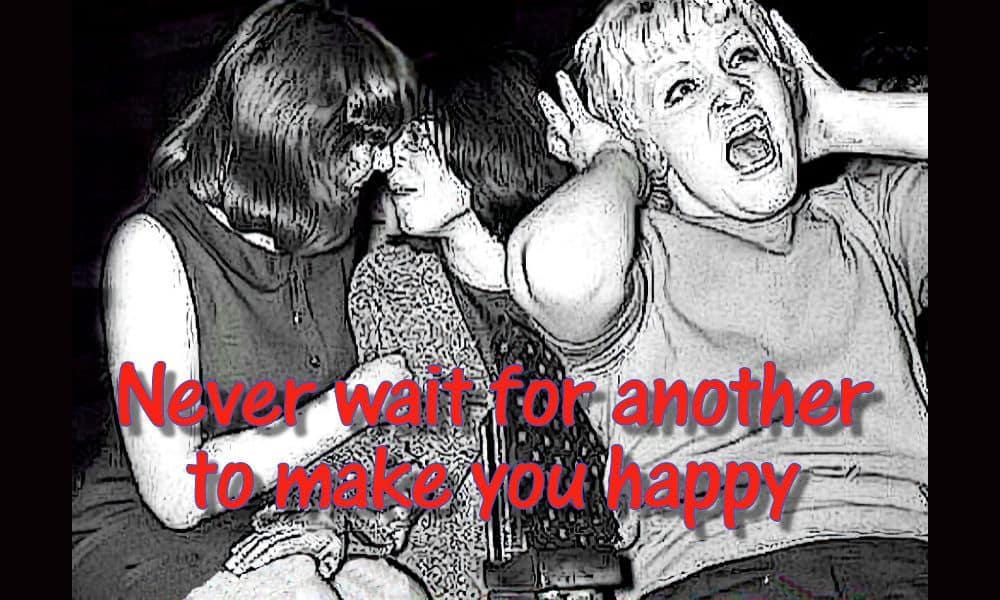About Happiness: Nothing, including happiness, comes from the outside, so, never wait for another to make you happy

Psst!! Hey!!!
** Want more great writing designed to help YOU to shift your behaviour?
** Want to learn how to find, build or deepen your principal relationship?
** Want to know more about Zen living and being?
Check out Wayne’s books! (amazon link)
Or, check them out right on our site.
Getting Past the error of “make you happy”

One of the things we really need to recognize is the utter futility of thinking that anything, and especially happiness, comes to us from the outside.
The reason this belief seems so real is that this is the reality of infancy and childhood.
When we are little, everything is given to us. We are hungry, someone feeds us, wet, we are changed, cold, and we are covered. Mom and dad seem to be god-like figures that appear and disappear magically from our limited, almost autistic reality. As we have no experience, no personal history, what we perceive is this: I have a need, and “god” magically appears and fulfills it.
Most moms and dads want us to be content, to be happy. When infants cry, adults rush in to make it all better. Now, remember, the infant has no way of knowing that this is because (s)he is an infant.
In other words, the kid is not thinking, “OK, I’d better enjoy this while I can, because soon I’ll be expected to look after myself.”
What is impressed on our child-mind is that rescue comes from outside. Then adulthood comes along, and it is abundantly clear that there is no external rescue. Yet for many, this is completely unacceptable.
Virtually all sex / relationship issues are the result of this fundamental misunderstanding.
It’s like this: the hormones kick in, and you are drawn to a particular person. On one level, there is the whole “procreate” energy. The cues are subtle and below the level of observation, and involve sight, sound and smell. Let us not forget — we are mammals.

We are also thinking mammals. And part of our thought process is a “just under the surface” longing to be loved as we were as infants — to be taken care of. As this thought bubbles up, we come up with all kinds of “reasonable” stories about why this would be eminently fair. No matter how this idea is described, however, it is always a one-way street. Let’s look at how this might be acted out.
Some people are bargainers. They think, “I’ll treat my partner as a king or queen, and then they will treat me the same.”
Others are romantics. They think, “Finally, I have found someone who recognizes how special and precious I am. (S)he will always be at my beck and call, feeding me, changing me, burping me… 😉 ”
Oops. I tipped my hand!
The root of this kind of immature thinking is, to repeat, our childhood experience of being cared for. None of us would be alive if our parents had not cared for us (no matter how poorly or basically) as infants. Despite being unable to remember any or the details of this time, at our core is a cellular memory of being looked after.
Let’s get real here:
It’s just kind of dumb to expect to be taken care of after we can care for ourselves.
Oh, I know. Hollywood has been feeding you bilge about true love being all about being treated “special.” You do know, don’t you, that movies aren’t real, right?
As we look at the above approaches, we see that the common idea is either entitlement or bargaining. Entitlement is the idea that “I am special, and the world owes me, and must treat me kindly.” Bargaining, “I am going to have to bribe someone to treat me as special, to give me what I deserve.”
Many relationships do start exactly this way: each partner goes out of their way to be kind, giving, helpful, gentle, and caring. And as we all know, the novelty begins to wear off around year three.
That’s because both of the “kids” get tired of the incessant, whiny demands of their partner. Interestingly, this is also the point where, when one whines, “You need to do this for me, if you love me!” that the correct reply becomes, “For god’s sake, grow up!”
Indeed. Growing up requires giving up both bargaining and entitlement.
The relationship I have with Darbella is based upon the joy I create for myself as I observe Dar living her life. I have someone to talk to who “gets me,” and who chooses to live with me without judgement or demand. She’s with me because she want to be with me. She is not trying to make me into who she wants me to be. And I see her, and respect and love her for exactly who she is, in this moment.
She cannot make me happy. There is no way for her to get into my head and sort out how I am viewing my reality. Only I can do that. There is no way for her to anticipate what I want, nor can she meet my unexpressed expectations. (I cannot tell you how many times I heard clients say, “We’ve been together for three years! He should know what I want by now!” Yikes!)
Adults ask for what they want, and are willing to take personal responsibility to get what they want. I’ve always said that if I want something badly enough, I can get it. I just might not be able to get it from the first person I ask.
It is not Darbella’s “job” to meet my every need. My mommy did that, until I was 2 or so. I am not married to my mommy. Dar’s only “job” is to show up and be honestly herself. My “job” is to show up and be me. Period.
Happiness is an inside job. It is not a factor of our location, our employment, whether or not we are getting what we want, or who we are in relationship with.
It is always and only about how I choose to view my life and my reality.
Happiness comes when I declare myself to be happy.
Every time you notice yourself judging another for “not making you happy,” give yourself a shake. Ask yourself why you are choosing unhappiness, and what you could do, right now, to shift that, for yourself. Take full, personal responsibility for who you are, where you are, and how you are.
You are an adult now. You are totally and completely responsible for your life. If you are in relationship, remember that relationships are places where we learn about ourselves — where we receive feedback and share curiosities about “how life is on our planet.”
Be with your partner because you are interested and “turned on” by their life-walk. And vice versa.
Embrace happiness as a life-choice. It is not something that happens to you. It is how you view what is happening to you. It is an internal sense, rather than an external gift. Lat those around you off the hook, and do what you need to do to be happy.
In other words, it is time to grow up.

Simple, profound lessons in relating
The. Best. Relationship. Ever.
Purchase all formats at Amazon
Purchase digital versions (Apple, Nook, Kobo, etc.) from this page





